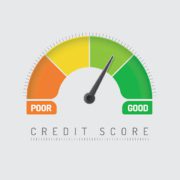Five Mortgage Interest Rate Factors You Control
Did you know that over 30 factors go into selecting a mortgage interest rate? In this post, we look at five things you can improve – and two factors you can’t control at all.
 When you’re considering a mortgage, your first thought is probably “Can I afford it?” A mortgage lender asks themselves a similar question: “Will this person be able to repay the loan?” To the lender, giving you a mortgage is a risk, no matter how great your credit history is or how much money you make. To offset some of the risk, lenders charge interest on the mortgage.
When you’re considering a mortgage, your first thought is probably “Can I afford it?” A mortgage lender asks themselves a similar question: “Will this person be able to repay the loan?” To the lender, giving you a mortgage is a risk, no matter how great your credit history is or how much money you make. To offset some of the risk, lenders charge interest on the mortgage.
A mortgage interest rate is usually calculated as a percentage of your loan amount. It’s added to the amount borrowed; most of your monthly payments go toward the principal, but some go to the interest rate. This rate can be fixed (i.e. the same for the entire loan period) or it can be variable (i.e. the rate rises or lowers at intervals throughout the loan period).
So, what affects the interest rate a lender offers you?
Five Mortgage Interest Rate Factors You (Mostly) Control
As we’ve said before on this blog, mortgage interest rates are not just about the borrower. They’re also about the lender, the market, and the economy as a whole. But there are some things you can control – at least partly:
- Credit Score. Your credit score is a big factor in determining your creditworthiness, or how much of a risk you represent to the lender. A credit score of under 640 can mean a higher interest rate; a score of 740 or above can get you a lower rate. Here’s how you can improve your credit score.
- Debt Ratio. The amount and kind of debt you have will impact your credit score, but lenders also look at the debt ratio itself. As a general rule, no more than 43% of your monthly income should go to defraying debt (e.g. car payments, credit cards, etc.). The reason is simple: the more debts you have, the more likely it is that you’ll have a hard time keeping up the payments.
- Down Payment / Loan Amount. A larger down payment can lower your loan amount, which means you could get a lower interest rate. If, for example, you pay 20% down instead of 10% down, you’ve removed some of the lender’s risk. Your reward: a lower interest rate and a substantial amount of savings.
- Loan Type. Different loan types come with different requirements, guidelines, and interest rates. Check out these types of home loans to learn more.
- Home Location, Price, and Use. Ok, you may not have a lot of wiggle room on your home location or budget – but if you’re looking for value, you may want to shop around. Homes in different areas of the same city can be priced higher or lower according to demand; price impacts the loan amount, which affects the interest rate. And if you’re shopping for your primary residence (as opposed to a second home, vacation home, etc.), you’ll likely get a lower interest rate, too.
Two Mortgage Interest Rate Factors You Can’t Control
No matter who you are or what you make, the following factors are outside of your control. Unfortunately, they still affect your mortgage interest rate:
- Local Real Estate Market Conditions. If home sales are slow in your area, there’s less demand for mortgages. This means mortgage lenders have to compete a bit for business, which translates into a better deal for you. On the other hand, moving into a hot market means higher prices, higher demand, and higher interest rates.
- The Economy. During an economic downturn, mortgage rates tend to decline for the same reason as mentioned above: a lack of demand. During an economic upturn, people are more apt to start house shopping again, which drives up demand and interest rates.
So, if you’re shopping for a mortgage with a great interest rate, keep these factors in mind. Maybe you can increase your down payment or reduce your debt. Don’t forget to compare offers from different lenders; that too can help you find a better interest rate. If you’re not sure what your next move should be, talk with one of our mortgage specialists.
This blog post was written by experts at Mortgage 1 and originally appeared on www.mortgageone.com. Michigan Mortgage is a DBA of Mortgage 1.











